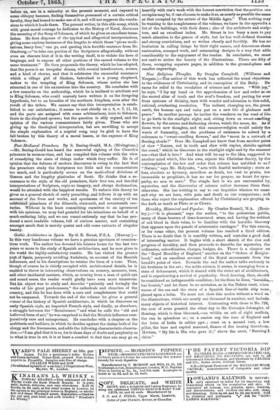New Religious Thoughts. By Douglas CampbelL (Williams and Norgate.)—The author
of this work has collected the usual objections to the evidences of Christianity, and its conception of the Deity. He turns for relief to the revelation of science and nature. "With joy," he says, "I lay my hand on the apprehension of law and order as on the sacred altar of truth and the soul's freedom, and parting for ever from systems of divinity, turn with wonder and-adoration to this solid, rational, everlasting revelation. The radiant, changing sea, the green earth, the human eye and voice put on a new life of gladness and peace." In another passage he invites the wanderer on the road of life- to go forth in the starlight night, and, sitting down on sweet-suselling- flowers, by the serene and darkening shores, watch the moon, &c. As if these were new thoughts, and this summer-religion would satisfy the wants of humanity, and the problems of existence be solved by a. reference to "sweet-smelling flowers," and the "moon in a network of fleeting clouds:" Does Mr. Campbell not know that from another point, of view " Nature, red in tooth and claw with rapine, shrieks against, the creed," which he discovers in the starlight night and by the summer sea—that God is love ? And what will he say to the idea, suggested to another mind which, like his own, rejects the Christian theory, by the contemplation of the law and order that science has unfolded to us 7 "Nature," says Mr. liolyoake, "acts with fearful uniformity ; stern as fate, absolute as tyranny, merciless as death, too vast to praise, toe inexorable to propitiate, it has no oar for prayer, no heart for sym- pathy, no arm to save." Tho simple fact is we are surrounded by: mysteries, and the discoveries of science rather increase them than otherwise. She has nothing to say to our inquiries whence we came and why we are here, with pain and death as our companions ; and those who reject the explanation offered by Christianity are groping in the dark as much as Plato or as Cicero.






























 Previous page
Previous page